He also led the league in scoring on his way to MVP honors that season, which caught the attention of scouts in both the NHL and the WHA, leading to Federko being drafted 6th overall by the Edmonton Oilers of the WHA and 7th overall by the St. Louis Blues of the NHL.
Federko opted to sign with St. Louis, who sent him to play with the Kansas City Blues of the Central Hockey League. After 42 games with Kansas City, he was leading the league in scoring with 30 goals and 69 points when summoned by St. Louis to make his NHL debut. He would play in the final 31 games of the year with the Blues, scoring 14 goals and 23 points. Despite not finishing the season in Kansas City, Federko was named the CHL Rookie of the Year.
Federko would never play another game in the minors once he was called up, and finished a second season with St. Louis at a very similar scoring pace, finishing with 41 points in 72 games, good for second on the team behind Gary Unger's 52.
Now fully settled in to the NHL, Federko unleashed his offensive game in 1978-79, scoring 31 goals and 95 points to lead the Blues in scoring for the first of eight consecutive seasons.
He pushed his goal total up to 38 the following season with a nearly identical 94 points which led to his first NHL All-Star Game appearance. 1980-81 saw him achieve his first 100 point season when he tallied 104 points for his third consecutive top ten finish in league scoring and a second consecutive NHL All-Star Game appearance.
A fourth straight 30 goal season came in 1981-82 followed by a somewhat down year for Federko, as he was held to 24 goals and 84 points in 1982-83, but rebounded in 1983-84, as he set career highs with 41 goals and 107 points to once again return to the top ten scorers in the NHL.
After a 30 goal, 103 point campaign in 1984-85, his seventh 30 goal season came in 1985-86 with 34 goals and his fourth 100 point season with 102. The Blues would qualify for the playoffs for the seventh consecutive season and make the deepest run of Federko's career, as they would reach the conference finals while Federko scored 7 goals and 21 points in 19 games.
The 1986-87 season saw him finish second in scoring for St. Louis to Doug Gilmour when Federko was limited to 64 games and 72 points. He rebounded with 89 points in 79 games in 1987-88, which included the 1,000th point of his NHL career on March 19, 1988, but time was catching up to Federko.
Despite a decline in his offensive numbers, his final season in St. Louis saw him named as the Blues team captain and still producing at a point per game, with 22 goals and 67 points in 66 games. He'd finish his career in St. Louis with 4 goals and 12 points in 10 playoff games, his 10th consecutive postseason with the Blues.
Prior to the start of the 1989-90 season, Federko and Tony McKegney were traded to the Detroit Red Wings for Paul MacLean and Adam Oates.
Federko, a center, was re-united with his former Blues head coach Jacques Demers, but was behind Steve Yzerman on the Red Wings depth chart. This resulted in a cutback on his ice and power play time, resulting in 17 goals and just 57 points, his lowest in 12 seasons, leading him to retire with exactly 1,000 NHL games played.
Federko's final NHL totals were 1,000 games played, 369 goals and 761 assists for 1.130 points and Blues team records for Career Games Played (927), Career Assists (721), Career Points (1,073) and Career Playoff Assists (66).
Federko had his number 24 retired by the Blues in 1991 and was announced as a new member of the Hockey Hall of Fame in on this date in 2002.
Today's featured jersey is a 1988-89 St. Louis Blues Bernie Federko jersey as worn during his final season in St. Louis when he served as the Blues team captain.
This is an amazing example of a Blues jersey, as it not only has the captain's "C", but also a pair of memorial patches, the #8 on the left shoulder for Barclay Plager and the "DK" shamrock for long time Blues broadcaster Dan Kelly.
The Blues adopted this basic jersey style in 1984-85, which featured a darker shade of blue and the name "BLUES" arched over the blue note crest. After three seasons, the wordmark was dropped, leaving just the blue note once again. This new version of the Blues jersey was worn for the final two seasons of Federko's career and seven seasons overall.

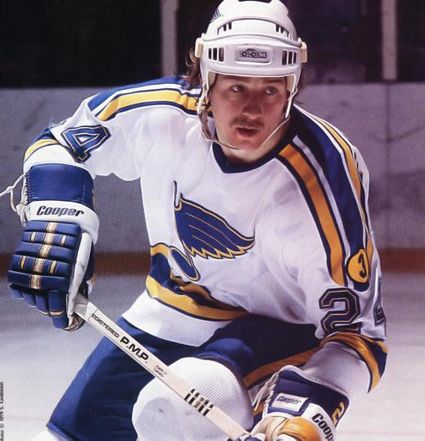
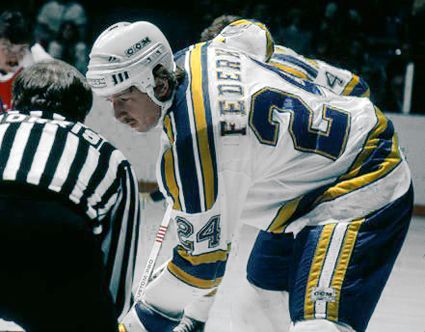
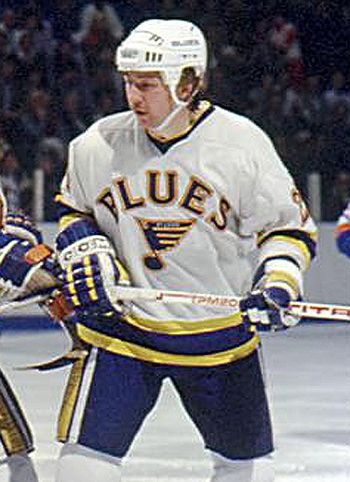
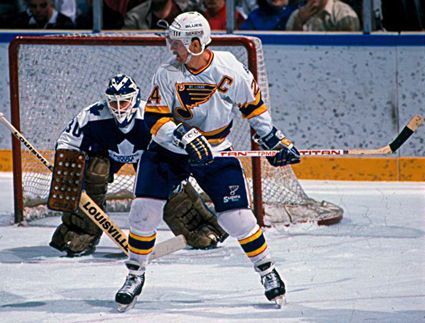
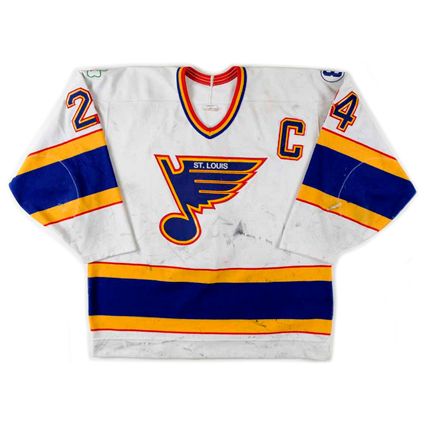
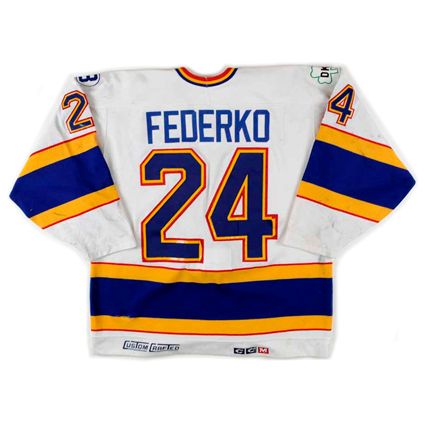
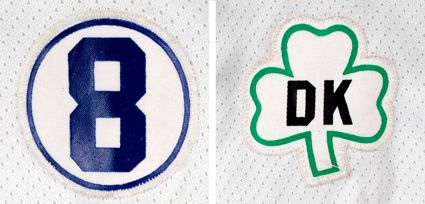










No comments:
Post a Comment
We welcome and encourage genuine comments and corrections from our readers. Please no spam. It will not be approved and never seen.